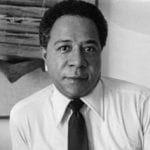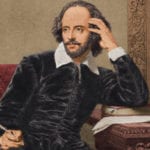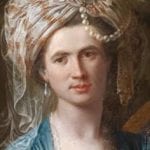 Technology
Technology  Technology
Technology  Movies and TV
Movies and TV 10 Film Shoots That Almost Ended in Disaster
 Politics
Politics The 10 Most Bizarre Presidential Elections in Human History
 Weird Stuff
Weird Stuff 10 Eggs-traordinarily Odd Eggs
 History
History 10 Desperate Last Stands That Ended in Victory
 Animals
Animals Ten Times It Rained Animals (Yes, Animals)
 Mysteries
Mysteries 10 Devastating Missing Child Cases That Remain Unsolved
 Creepy
Creepy 10 Scary Tales from the Middle Ages That’ll Keep You up at Night
 Humans
Humans 10 One-of-a-kind People the World Said Goodbye to in July 2024
 Movies and TV
Movies and TV 10 Holiday Movies Released at Odd Times of the Year
 Technology
Technology Making 10 Common Products from Very Unusual Sources
 Movies and TV
Movies and TV 10 Film Shoots That Almost Ended in Disaster
 Politics
Politics The 10 Most Bizarre Presidential Elections in Human History
Who's Behind Listverse?

Jamie Frater
Head Editor
Jamie founded Listverse due to an insatiable desire to share fascinating, obscure, and bizarre facts. He has been a guest speaker on numerous national radio and television stations and is a five time published author.
More About Us Weird Stuff
Weird Stuff 10 Eggs-traordinarily Odd Eggs
 History
History 10 Desperate Last Stands That Ended in Victory
 Animals
Animals Ten Times It Rained Animals (Yes, Animals)
 Mysteries
Mysteries 10 Devastating Missing Child Cases That Remain Unsolved
 Creepy
Creepy 10 Scary Tales from the Middle Ages That’ll Keep You up at Night
 Humans
Humans 10 One-of-a-kind People the World Said Goodbye to in July 2024
 Movies and TV
Movies and TV 10 Holiday Movies Released at Odd Times of the Year
Top 10 Greatest Writers From 10 Languages
This lister is not an expert on the literature of every language on Earth, and since there are well over 6,000 more, follow-ups are certainly welcome. These entries are listed in no particular order. You are welcome to suggest other “runners-up” if you feel someone particularly important has been left out. Also feel free to name the best writers in your own language if they are not listed here.
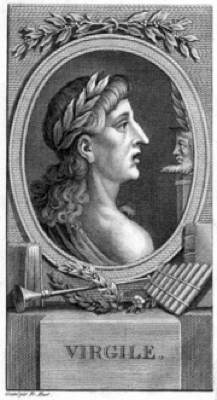
runners-up: Marcus Tullius Cicero, Gaius Julius Caesar, Publius Ovidius Naso, Quintus Horatius Flaccus
You’re sure to remember Vergil because of The Aeneid, his poetic account of the fall of Troy and founding of Rome under Aeneas. Vergil may have been the strictest perfectionist in literary history. He wrote The Aeneid at the astoundingly slow rate of 3 lines per day. He proceeded no faster because he wanted to be sure there was no better way to write those three lines. In Latin, a clause, whether dependent or independent, can be written in any word order, with a few exceptions. Thus, the poet has a huge amount of liberty in determining how the poetry sounds, without altering the meaning in any way. Vergil considered every option available at every step.
Vergil also wrote two other works in the Latin canon, the Eclogues (c. 38 BC) and the Georgics (c. 29 BC). The Georgics are 4 partly didactic poems on farming, including all sorts of advice, such as not planting your grapevines anywhere near your olive trees: olive leaves are extremely flammable, and in the dry late summer, a bolt of lightning can turn them and everything nearby into an inferno. He also praised Aristaeus, the god of beekeeping, because honey was the only source of sugar for the European world until sugar cane was imported from the Caribbean. Bees were thus deified, and Vergil explained how to acquire a hive if the farmer has none: kill a deer or boar or bear, cut it open and leave it in the woods, pray to Aristaeus, and in a week’s time, he will send a beehive to the carcass.
Vergil wrote in his will that he wanted The Aeneid (19 BC) burned upon his death, since it was unfinished. Caesar Augustus refused.
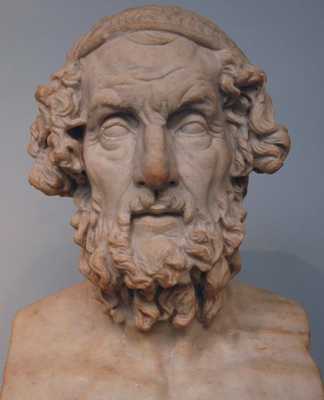
runners-up: Plato, Aristotle, Thucydides, Paul of Tarsus, Euripides, Aristophanes
If these entries were in any sort of ascending order, Homer would very possibly be #1. He may have been one blind man telling stories that were written down 400 years later. Or he may have been a centuries-long committee of men and women all adding to the stories of the Trojan War and Odysseus’s aftermath.
Either way, Ancient Greek is practically founded on The Iliad and The Odyssey (both c. 750 BC). The dialect has come to be known as the Homeric, as opposed to the Attic which followed, and the Koine, which followed that. The Iliad is concerned with the last of ten years the Greeks fought the Trojans outside the walls of Troy (Ilion). Its central theme is Μῆνιν Ἀχιλῆος / οὐλομένην, or “the murderous rage of Achilles.” Achilles is infuriated with Agamemnon for treating Achilles and all his spoils as Agamemnon’s property, and so refuses to fight for 10 years, while the Greeks lose thousands of men against the Trojans.
Finally, his best friend (and probable lover), Patroclus, can stand the wait no longer and joins in the fighting for his own glory, but gets killed by Hector. Achilles enters the fray and drives whole battalions of Trojans in terror before him, singlehandedly killing scores, even fighting Xanthus, the god of the river Scamander. Achilles finally kills Hector, and the story ends with funeral games for him and Patroclus.
The Odyssey is an equally unrivaled masterpiece of adventure, much of it told in genius flashbacks, about the 10 year wandering journey of Odysseus, attempting to return home with his men. The details of Troy’s fall are mentioned briefly when Odysseus ventures into the Land of the Dead and finds Achilles, among others.
These are the only two works of Homer that have survived, if there were any more, but all of Western literature rests on Homer’s laurels. These two poems are written in dactylic hexameter, and today this meter is called the heroic meter or the Homeric meter as a result. More poetry has been written, in the Western tradition, in honor of Homer than any other person, real or fictitious, except Jesus and the Virgin Mary.
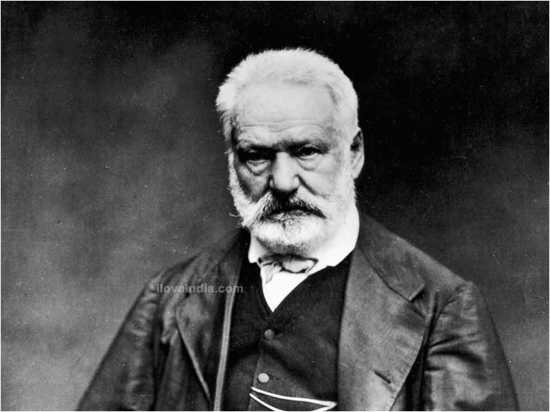
runners-up: Rene Descartes, Voltaire, Amexandre Dumas (pere), Moliere, Francois Rabelais, Marcel Proust, Charles Baudelaire
The French have long been fans of massive novels, the longest of which is A la recherché du temps perdu, or In Search of Lost Time, by Marcel Proust. Hugo, however, is remembered as the absolute pinnacle of French prose, and one of the greatest of its poetry, of the 19th Century. He wrote two magna opera, Notre Dame de Paris (1831) and Les Miserables (1862). The former is popularly known as “The Hunchback of Notre Dame,” and it does not have a happy ending like the Disney version. In it, everything bad that could happen to Quasimodo happens to him.
He loves Esmeralda, who is kind-hearted to him. But Frollo, the evil priest, wants her also, and when he sees that she almost has sex with Captain Phoebus, he has her captured and charged with the attempted murder of Phoebus, a crime Frollo actually committed. She is tortured with the Spanish boot, which slowly crushes her foot until she “confesses.” Then she is sentenced to be hanged, only to be rescued by Quasimodo.
The citizens think Quasimodo is the bad guy, and storm Notre Dame to rescue Esmeralda. Frollo sends the king’s guards to steal her back, and after she rebuffs his romantic advances, he gives her to the guards to be hanged, and laughs while she drops through the gallows, until Quasimodo pushes him off the bellower to his death. Quasimodo then goes to Esmeralda’s corpse in a mass grave beneath the gibbet of Montfaucon, where he cries over her until he starves to death. 18 months later, someone attempts to untangle the two skeletons, only for them to crumble to dust.
Les Miserables, which means “The Miserable Ones,” isn’t much cheerier, similar to Dickens’s Oliver Twist, but at least Cosette survives, having suffered for her entire life, like everyone else in the story. It’s a classic story of fanatical adherence to the law (Javert), and almost no one in the world trying to help those miserable ones who need it most.
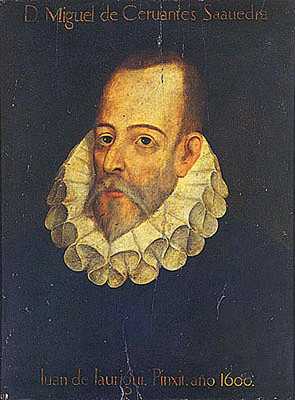
runners-up: Jorge Luis Borges
Cervantes’s magnum opus is El ingenioso hidalgo don Quijote de la Mancha (1605, 1615), or The Brilliant Gentleman Don Quixote of La Mancha. He also wrote a collection of short stories, a romance titled La Galatea, and a romance titled The Travails of Persiles and Sigismunda.
Don Quixote is actually quite hilarious, even today, as the title character, whose real name is Alonso Quijano, reads so many stories about feudal chivalry, knights and their ladies fair, that he takes it upon himself, by riding across the countryside getting in adventures, to make everyone in the land remember what swashbuckling used to mean. He befriends an ordinary farmer, Sancho Panza, and makes him his page. Sancho remains a sort of control group throughout the novel, reminding Quixote and the audience of reality.
Quixote famously jousts with windmills, attempts to rescue people who usually don’t need rescuing, and gets beaten severely on more than one occasion. The second part of the book, published 10 years after the first, is possibly the first work of modern literature. The characters themselves know all about the history of Don Quixote, as written down in the first part. Now everyone he meets attempts to ridicule him and Sancho, testing his faith in his sense of chivalry. He finally returns to reality when he loses a fight with the Knight of the White Moon, goes home and eventually falls ill and dies, leaving all his money to his niece, provided that she does not marry a man who reads swashbuckling tales of chivalry.
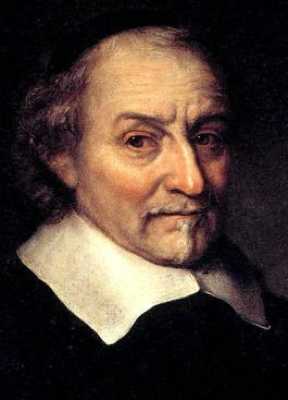
runners-up: Pieter Hooft, Jacob Cats
Vondel is revered in the Netherlands above all other writers. He was a poet and playwright at the pinnacle of Dutch literature’s Golden Age. His most well known play is Gijsbrecht van Amstel, a historical drama that was performed every new Year’s Day from 1638 to 1968 in the city theater of Amsterdam. It tells the story of the title character, Gijsbrecht IV, who according to the play, invaded Amsterdam in 1303 to restore his nobility and family honor, establishing a sort of barony in the area. Vondel’s historical sources were incorrect, in that the invasion was carried out by Gijsbrecht’s son, Jan, who is the real hero in overthrowing the tyrants of the area. Today, Gijsbrecht is a national hero because of mistaken identity, which probably would have been a source of marked amusement to Vondel, who was a master of comedic plays.
He also wrote an epic poem, his masterpiece, titles Joannes de Boetgezant (1662), or John the Baptist, about the history of John’s life. This is esteemed as the National Epic of the Netherlands. For those of you who are American, consider the prestige of such a title: is there any consensus on a national book of any kind of America? What would the primary contenders be? Moby Dick, The Adventures of Huckleberry Finn, The Scarlet Letter, and more perhaps. Combine them all, and that is the reverence with which Vondel is held in his country today. He also wrote a play titled Lucifer (1654), which explores the biblical character’s psyche, character, and motives, in order to answer the question of why he does what he does in the Bible. This play was a large source of inspiration for John Milton’s Paradise Lost, which was published 13 years later in 1667.
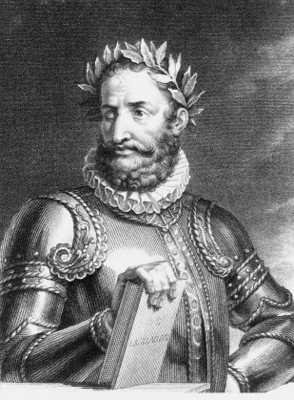
runners-up: Eca de Queiroz, Fernando Pessoa
Camoes is today remembered as the Bard of Portugal. He wrote poetry on par with that of the absolute greats of the other European languages, and his supreme masterwork is Os Lusiadas (1572), The Lusiads. Lusiads refers to the people who inhabit the Roman region Lusitania, which is modern-day Portugal. The root of the word is Lusus, who was the friend of Bacchus, the god of wine, and who was thought to have founded the Portuguese people. Os Lusiadas is an epic poem in 10 books, written in ottava rims, or rhyme to the eighth. Each eight-line stanza uses the standard scheme ABABABCC.
The poem tells of all the famous Portuguese maritime voyages to discover, conquer, and colonize new worlds and cultures. It is similar to Homer’s Odyssey, and Camoes honors Homer and Vergil many times throughout. The story begins during the voyage of Vasco da Gama. The poem is historical, recounting various battles, the Revolution of 1383-85, da Gama’s discovery of, and trade with, Calicut, India (not Calcutta). The Lusiads are always watched over by the Greek gods, though da Gama, who is Catholic, prays to his own God. The poem ends with a mention of Magellan and the glorious future to come for Portuguese seafaring history.
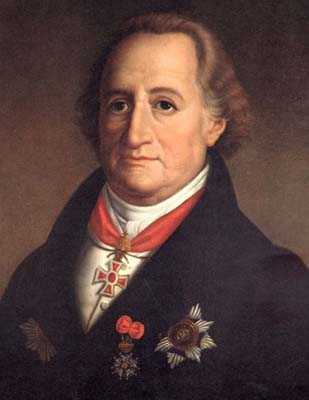
runners-up: Friedrich von Schiller, Arthur Schopenhauer, Richard Wagner, Heinrich Heine, Franz Kafka
It has been said that you can’t talk about German music without saying “Bach,” and you can’t talk about German literature of any kind without saying “Goethe.” Every major writer who followed Goethe either wrote about him or used his ideas to found their own careers and styles. He wrote four novels, tons of poetry and nonfiction, and scientific essays. His indisputably most famous work is Die Leiden des jungen Werthers, or The Sorrows of Young Werther (1774). It singlehandedly founded the “Sturm ind Drang” movement of German Romanticism. When you listen to Beethoven’s 5th Symphony, you’re hearing music that fits “Werther” perfectly.
Werther tells of the title character’s unfulfilled romance, which leads to his suicide. It is told in the form of letters, and popularized the epistolary novel for at least a century and a half. Goethe’s absolute masterpiece is Faust, in two parts. The first part was published in 1808, the second in 1832, the year of his death. The legend of Faust had been around for a long time before Goethe, but his dramatic treatment of it remains the most well known the world over.
Faust is a scholar whose extreme knowledge and wisdom please God. God challenges Mephistopheles, or Satan, to corrupt Faust. Thus, the story owes a lot to the Book of Job. The idea of making a deal with the Devil is nowhere more famous than in this story. Faust signs a contract in blood with Satan, promising his soul in exchange for Satan doing for him anything he wants on Earth. He gets to be young again, and fall in love with Gretchen. Gretchen uses a potion Faust gives her to make her mother sleep, but accidentally kills her with it. This drives Gretchen insane and she drowns her newborn child, bringing her a death sentence. Faust and Satan break into the prison to rescue her, but Gretchen refuses to leave. Faust and Satan escape, and God proclaims Gretchen forgiven as she awaits execution.
Part 2 is extremely difficult reading, as you must be thoroughly fluent in Greek mythology. It is more or less an expansion of the Gretchen storyline of Part 1. Faust, with Satan’s help, becomes an extremely powerful, and corrupt, man on Earth, until at the very end, he remembers the delight in being a good person and dies on the spot. Satan goes for his soul, but angels take it away and everyone is transported to a mountain paradise where Pater Profundus explains in a parable the nature of man. Angels plead for the soul of Faust, who is reborn and enters Heaven. This final scene was set to spectacularly glorious music by Gustav Mahler, as Part 2 of his 8th Symphony.
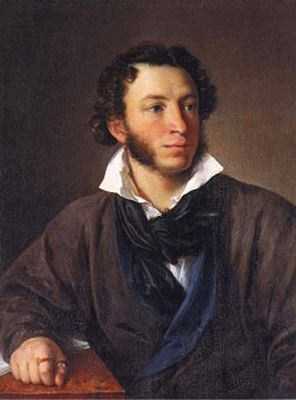
runners-up: Leo Tolstoy, Anton Chekhov, Fyodor Dostoyevsky
Today, Pushkin is remembered as the father of that literature which is uniquely Russian in character, as opposed to the literature written in Russia which had a decidedly Western European flair. Pushkin was a poet primarily, but wrote in all genres, and his masterworks are Boris Godunov (1831) and Evgeny Onegin (1825-32). The first is a play, the second a novel in verse form. Onegin is written entirely in sonnets, and Pushkin invented a new form of sonnet to distinguish this work from the sonnets of Petrarch, Shakespeare, and Edmund Spenser. The rhyme scheme is AbAbCCddEffEgg, where uppercase letters are feminine rhymes, and lowercase the masculine rhymes. A feminine rhyme is a rhyme on two or more syllables, such as “grainy/rainy.” A masculine rhyme is the rhyme most poets use, consisting on only one syllable, thus, “grain/rain.”
The title character is today the model on which all Russian literary heroes are based. Eugene Onegin is referred to as a superfluous man, or a man who does not fit any norm of responsibility in society. He wanders, he gambles, he duels for his honor, and may be fairly called a sociopath, though not violent or evil; rather, he is sociopathic in the strictest sense of the word, a man who has no concern for the values or rules of society. Onegin is the first and still best example from Russia. Many of Pushkin’s works have been adapted into operas and ballets. It is infamously difficult to translate into any other language, precisely because poetry simply cannot maintain its uniqueness and sound (the latter especially distinguishes poetry from prose) when changed into different words. Languages frequently disagree on the possibilities of words. In English, there is one word for that white icy stuff that falls in winter: “snow.” In one dialect of Inuit (Eskimo) there are 45 words for it.
Thus there are about a dozen translations of Onegin into most of the languages of Europe. Vladimir Nabokov famously translated it into English, expanding the text from 1 volume to 4. Nabokov preserves all the definitions and connotative nuances, but completely disregards the music of the poetry. All of this is because Pushkin had an extremely unique writing style, exploring all aspects of the Russian language, even inventing new syntactical and grammatical ideas and words, while also founding a number of conventions that almost all Russian writers have used ever since.
runners-up: none
In the title is Dante Alighieri’s full name, where “Alighieri” is the modern spelling of his father’s name, Alaghiero or Alighiero. “Dante” is short for “Durante,” which is Latin for “enduring” or “everlasting.” Dante regulated the various Italian dialects of his time into today’s modern Italian. The dialect of Tuscany, where Dante was born in Florence, is now the standard of all Italy because of La Divina Commedia (1321), The Divine Comedy, his masterwork, and one of the preeminent literary masterpieces of the whole world for all time.
At the time he wrote it, Italy’s regions each spoke its own dialect, where Tuscan is quite different from, say, Venetian. Today, when you study Italian as a foreign language, you almost always begin with the Florentine variation of Tuscan, because of the significance of the Divine Comedy. You’re sure to have a general understanding of what happens in the poem. Dante travels through Hell and Purgatory with #10 as his guide, to explore the punishments to which the guilty of various sins are condemned. Every punishment is an example of “contrabass,” which denotes justice opposed to the crime: those guilty of lust are swept forever around by wind, regardless of their fatigue, just as the wind of lust swept them around in life; those whom Dante judged schismatics – guilty of splitting the one true church into other branches, including Mohammed – are condemned to be split open from collar to groin by a demon with a great sword, and then to rip themselves open wider as they walk in a circle, back around to be hacked open again.
His depiction of Heaven, in Paradiso, is equally indelible, using the Ptolemaic concept of the heavens as 9 concentric spheres, each level bringing him and Beatrice, his guide, closer to God at the top. After meeting various celebrities from the Bible, Dante comes face to face with God Almighty, in the form of three perfect circles of light, distinct and yet also united in one, out of which walks Jesus, the human manifestation of God.
Dante also wrote other smaller poems and essays, one of them, De vulgar eloquent, about the importance of Italian being spoken in one modern vernacular as Latin was. He also wrote a poem with prose passages in it called La Vita Nuova, the New Life, in which he champions chivalric love. No other writer owns a language as firmly as Dante owns Italian.

runners-up: John Milton, Samuel Beckett, Geoffrey Chaucer, Virginia Woolf, Charles Dickens
Voltaire called Shakespeare “that drunken fool,” and his body of work “this enormous dunghill.” So the Bard’s reputation is not undisputed. Nevertheless, there can be no denial of his influence on all subsequent literature, not just in English, but in a huge portion of the world’s 6800 or so languages. He is, by far, the most translated author, with his complete works appearing in some 70 languages, and various plays and poems in over 200.
Of the English language’s popular phrases, quotations, and idioms, 60% or so comes from the King James Bible. Over 30% comes from Shakespeare, among them, “It was Greek to me” (Julius Caesar); “all the world’s a stage” (As You Like It); “one who loved not wisely but too well” (Othello); “the wheel is come full circle” (King Lear); you’re a real “piece of work” (Hamlet).
The convention in Shakespeare’s day was for a tragedy to require the death of at least one main character in the end, and if it is a good tragedy, everybody dies (Hamlet – c. 1599-1602, King Lear – c. 1606, Othello – c.1603, Romeo and Juliet – c. 1597). At the other end of the spectrum, a comedy results in two of the main characters getting married at the end, and if it’s a good comedy, everyone gets married (A Midsummer Night’s Dream – c. 1596; Much Ado about Nothing – c. 1599; The Merry Wives of Windsor – c. 1602). Shakespeare weaves the heightening tensions among the characters in such perfect alignment with the plot that when everything comes to a head, the climax isn’t thought of as obligatory, or just an excuse to have some killing, but the organic, excellent result of the human nature depicted in the play. No one has ever done it better.
The true genius underlying all of Shakespeare’s works, his sonnets, plays, and other poems, is extreme cynicism. He routinely glorifies the highest moral principles of humanity, but these principles are always expressed in terms of a perfect world; whereas, he also “holds up the mirror to nature,” so that no audience may complain that he is degrading us: we are Othello, Hamlet, Lear, Brutus, Beatrice and Benedick. They are the best we can do.

